By Esha Chaudhuri
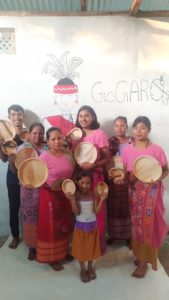 As the world has been observing unprecedented climatic changes, unexplained heat waves, and drastic melting of glaciers, the resounding message of the recently observed International Day of Nature and Conservation on July, 28 has not echoed any louder. Weaving this with GoGaro’s initiative to build economically viable women, Sunday Shillong unearths an empowering story scripting a life of transformation with futuristic aspirations that is environmentally sustainable, resonating values of eco feminism – a branch of feminism that interprets a unique connection between women and the environment by drawing parallels with nature’s degradation akin to women’s undervaluing in society with a solution based approach for both.
As the world has been observing unprecedented climatic changes, unexplained heat waves, and drastic melting of glaciers, the resounding message of the recently observed International Day of Nature and Conservation on July, 28 has not echoed any louder. Weaving this with GoGaro’s initiative to build economically viable women, Sunday Shillong unearths an empowering story scripting a life of transformation with futuristic aspirations that is environmentally sustainable, resonating values of eco feminism – a branch of feminism that interprets a unique connection between women and the environment by drawing parallels with nature’s degradation akin to women’s undervaluing in society with a solution based approach for both.
Treading Nature’s path
Operating out of Meghalaya’s Dehalbagan village in Byrnihat, Ri-Bhoi District, the SBI Foundation through its youth wing began in 2018 to build a community of self-reliant and financially independent women. A unique 13-month programme, by this Corporate Social Responsibility (CSR) wing aims to make a difference in rural India through the active participation of its fellows in community projects.
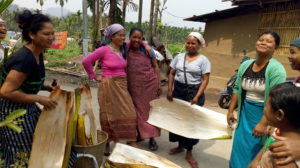 In its fourth consecutive year of continuity, the current fellow, Shweta Sharma has been working with four women, namely, Mijit R. Marak, Ronoli D. Marak, Linda D. Shira, Jinitha Sangma, who are also the face of the brand ‘GoGaro’. The brand was launched by the Nangrima SHG (Self Help Group) that makes eco-friendly and 100% non-toxic plates and bowls made from locally sourced areca leaves with the goal to assist women belonging to rural areas earn ancillary forms of income.
In its fourth consecutive year of continuity, the current fellow, Shweta Sharma has been working with four women, namely, Mijit R. Marak, Ronoli D. Marak, Linda D. Shira, Jinitha Sangma, who are also the face of the brand ‘GoGaro’. The brand was launched by the Nangrima SHG (Self Help Group) that makes eco-friendly and 100% non-toxic plates and bowls made from locally sourced areca leaves with the goal to assist women belonging to rural areas earn ancillary forms of income.
“I was charmed by the hard work these women put in and their unrelenting spirit even after endless hours of completing household chores and tending to their children moved me to work for them”, says an enthused Sharma, all of 26, and an otherwise English teacher by profession.
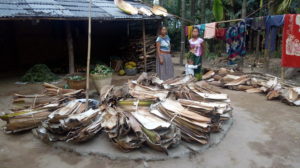 On identifying their targeted beneficiaries, Sharma shared that these women were from matrilineal communities, wherein the right to property and inheritance was supreme, but household decisions were still predominantly made by the men. The women belong to economically marginalised households with no source of stable income to make ends meet.
On identifying their targeted beneficiaries, Sharma shared that these women were from matrilineal communities, wherein the right to property and inheritance was supreme, but household decisions were still predominantly made by the men. The women belong to economically marginalised households with no source of stable income to make ends meet.
Thereafter, a convergence program between National Rural Employment Guarantee Act 2005 (NREGA) and Meghalaya State Rural Livelihoods Society (MSRLS) led to the construction of two Raw Material Stock Rooms as infrastructural support. Funding for machine procurement was availed by Community Support Investment, along with a Cash-Credit Loan that entitles every SHG.
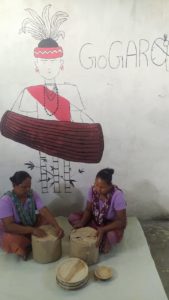 The objective was to make the best use of waste like picking up fallen leaves and creating biodegradable cutlery, while bearing no implications on the environment and nature, as well as educating people about making conscious choices in accordance with nature.
The objective was to make the best use of waste like picking up fallen leaves and creating biodegradable cutlery, while bearing no implications on the environment and nature, as well as educating people about making conscious choices in accordance with nature.
Challenges and sustainability
Shedding light on the challenges along the way, Sharma details, “It has been an uphill battle ever since the SHG started production in September 2019, electricity supply being erratic and low voltage as major concerns. But their (women from the SHG) undying spirit kept them going against all odds, collecting areca leaves from far off places, trekking on hills for several kilometres, drying, washing, heat-pressing them in machines, to even packaging along with managing their households.”
Conscious planning through SBI foundation’s vision and successful execution by Sharma’s grassroots involvement makes for a case of mention. Long term sustainability has been ensured by training them not just for producing but bookkeeping, selling, digital marketing, customer services and building networks to spread it across markets to ensure a continuity of orders throughout the year. In the long run, after the initial training has been imparted, the project will independently function under these women in the SHG.
A new leaf
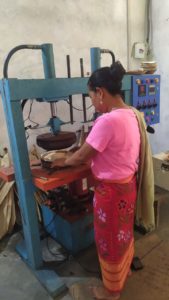 Imbibing the lessons and guidance, GoGaro’s products are now sold at various stores in cities of Guwahati and Shillong and the Nangrima SHG has even participated in the SHG Mela in Nongpoh in November 2021. Most importantly, the women that spearheaded the works have witnessed marked transitions. Elaborating on their journeys, economic elevation and respite, the beneficiaries speak aloud –
Imbibing the lessons and guidance, GoGaro’s products are now sold at various stores in cities of Guwahati and Shillong and the Nangrima SHG has even participated in the SHG Mela in Nongpoh in November 2021. Most importantly, the women that spearheaded the works have witnessed marked transitions. Elaborating on their journeys, economic elevation and respite, the beneficiaries speak aloud –
President of Nangrima SHG and otherwise a vegetable seller, Mijit (40) says, “GoGaro has given me financial independence and it helped me realise how important it is for a woman to have money of her own. The very first time I bought a pig from the money that we made from a huge sale, the feeling was inexplicable. The supplementary income is very much looked forward to since selling vegetables and areca nuts is just not enough to sustain a family. I value GoGaro as it’s going to make life better for my children.”
Speaking on her personal growth, another worker at the SHG, Jinitha Sangma (31) shares, “We used to be so shy to even respond to a question asked by a customer earlier and hardly ever went out. But with constant engagement in the market and with customers through setting up stalls at events, we have come a long way in terms of personality development and personal growth. GoGaro has given us the first opportunity to go on a train journey to represent our work at Saras Mela, Sikkim in 2019 which was an experience to remember.”
Additionally, Sangma has been able to buy clothes for herself and her children, Linda D. Shira paid the school fees for her children, and Ronoli spent her earnings on home essentials, from their first earned money through GoGaro.
As the Indian scholar, ecofeminist, and popular environment activist, Vandana Shiva articulated, “The liberation of the earth, the liberation of women, the liberation of all humanity is the next step of freedom we need to work for, and it’s the next step of peace that we need to create.”
Conservation mindset
True to its goal of upgrading livelihoods without harming the environment, with their products out for sale along with its increasing popularity, people have been considering purchasing their products in bulk for large scale events such as weddings, festivals, social events. According to Sharma, there has been an upward trend in their marketing graph following the recent single use plastic ban and making headway towards being green consumers.
Creating collective consciousness about the environment, about its women and their innate connection with nature, GoGaro has set its heart out to carve a progressive space for its women.
A staunch believer of bottom-up change, Sharma articulates, “I encourage you all to take chances and do something beyond one’s regular job, to add onto someone’s life far from the narrow ideas of one’s home and family.”
GoGaro is now a slogan for women of the community who have witnessed remarkable change in their stories of reformation. After all, embracing small steps of collective action through the power of people, especially women, in this case, brings about desired change.



